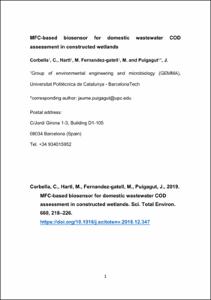Mostra el registre d'ítem simple
MFC-based biosensor for domestic wastewater COD assessment in constructed wetlands
| dc.contributor.author | Corbella Vidal, Clara |
| dc.contributor.author | Hartl, Marco |
| dc.contributor.author | Fernández Gatell, Marta |
| dc.contributor.author | Puigagut Juárez, Jaume |
| dc.contributor.other | Universitat Politècnica de Catalunya. Doctorat en Enginyeria Ambiental |
| dc.contributor.other | Universitat Politècnica de Catalunya. Departament d'Enginyeria Civil i Ambiental |
| dc.date.accessioned | 2020-04-01T15:22:28Z |
| dc.date.available | 2020-04-01T15:22:28Z |
| dc.date.issued | 2019-04 |
| dc.identifier.citation | Corbella, C. [et al.]. MFC-based biosensor for domestic wastewater COD assessment in constructed wetlands. "Science of the total environment", Abril 2019, vol. 660, p. 218-226. |
| dc.identifier.issn | 0048-9697 |
| dc.identifier.other | https://arxiv.org/abs/2003.14078 |
| dc.identifier.uri | http://hdl.handle.net/2117/182770 |
| dc.description.abstract | In the context of natural-based wastewater treatment technologies (such as constructed wetlands - CW) the use of a low-cost, continuous-like biosensor tool for the assessment of operational conditions is of key importance for plant management optimization. The objective of the present study was to assess the potential use of constructed wetland microbial fuel cells (CW-MFC) as a domestic wastewater COD assessment tool. For the purpose of this work four lab-scale CW-MFCs were set up and fed with pre-settled domestic wastewater at different COD concentrations. Under laboratory conditions two different anodic materials were tested (graphite rods and gravel). Furthermore, a pilot-plant based experiment was also conducted to confirm the findings previously recorded for lab-scale experiments. Results showed that in spite of the low coulombic efficiencies recorded, either gravel or graphite-based anodes were suitable for the purposes of domestic wastewater COD assessment. Significant linear relationships could be established between inlet COD concentrations and CW-MFC Ecell whenever contact time was above 10 hours. Results also showed that the accuracy of the CW-MFC was greatly compromised after several weeks of operation. Pilot experiments showed that CW-MFC presents a good bio-indication response between week 3 and 7 of operation (equivalent to an accumulated organic loading between 100 and 200 g COD/m2, respectively). Main conclusion of this work is that of CW-MFC could be used as an "alarm-tool" for qualitative continuous influent water quality assessment rather than a precise COD assessment tool due to a loss of precision after several weeks of operation. |
| dc.format.extent | 9 p. |
| dc.language.iso | eng |
| dc.publisher | Elsevier |
| dc.rights | © 2019. Elsevier |
| dc.rights | Attribution-NonCommercial-NoDerivatives 4.0 International |
| dc.rights.uri | https://creativecommons.org/licenses/by-nc-nd/4.0/ |
| dc.subject | Àrees temàtiques de la UPC::Desenvolupament humà i sostenible::Enginyeria ambiental::Tractament de l'aigua |
| dc.subject.lcsh | Constructed wetlands |
| dc.subject.other | Microbial fuel cells |
| dc.subject.other | Biosensor |
| dc.subject.other | Real wastewater |
| dc.subject.other | Constructed wetlands |
| dc.subject.other | Gravel-based anode |
| dc.title | MFC-based biosensor for domestic wastewater COD assessment in constructed wetlands |
| dc.type | Article |
| dc.subject.lemac | Zones humides artificials |
| dc.contributor.group | Universitat Politècnica de Catalunya. GEMMA - Grup d'Enginyeria i Microbiologia del Medi Ambient |
| dc.identifier.doi | 10.1016/j.scitotenv.2018.12.347 |
| dc.description.peerreviewed | Peer Reviewed |
| dc.relation.publisherversion | https://www.sciencedirect.com/science/article/pii/S0048969718352409 |
| dc.rights.access | Open Access |
| local.identifier.drac | 23663438 |
| dc.description.version | Postprint (author's final draft) |
| dc.relation.projectid | info:eu-repo/grantAgreement/EC/H2020/676070/EU/Sustainable Product, Energy and Resource Recovery from Wastewater/SuPER-W |
| local.citation.author | Corbella, C.; Hartl, M.; Fernandez, M.; Puigagut, J. |
| local.citation.publicationName | Science of the total environment |
| local.citation.volume | 660 |
| local.citation.startingPage | 218 |
| local.citation.endingPage | 226 |
Fitxers d'aquest items
Aquest ítem apareix a les col·leccions següents
-
Articles de revista [126]
-
Articles de revista [3.031]
-
Articles de revista [202]


